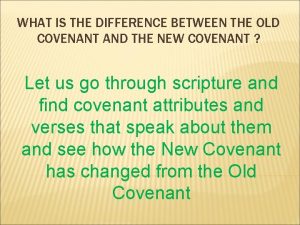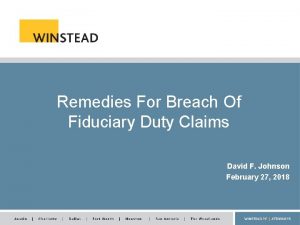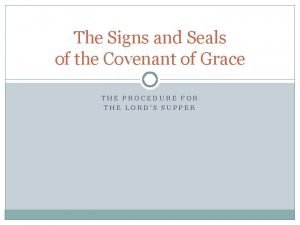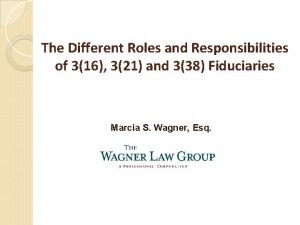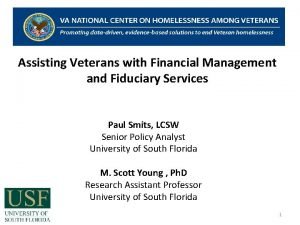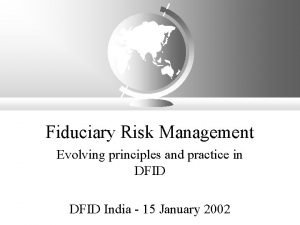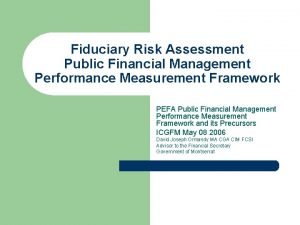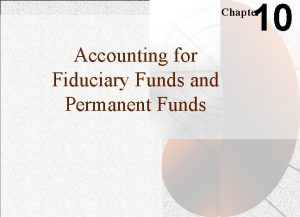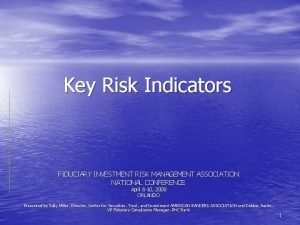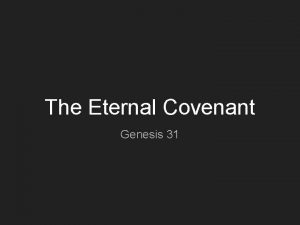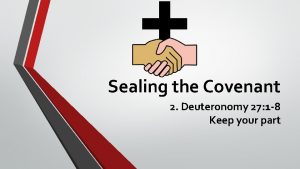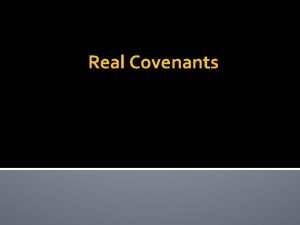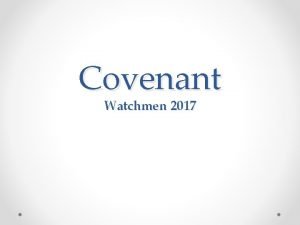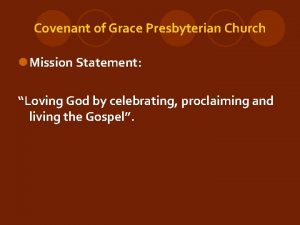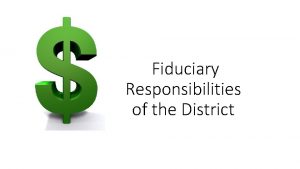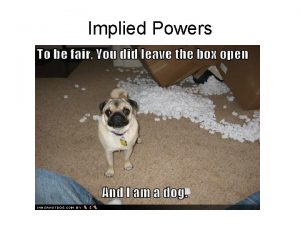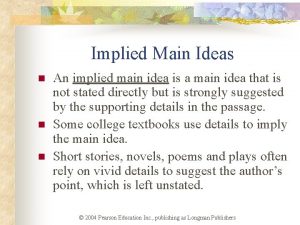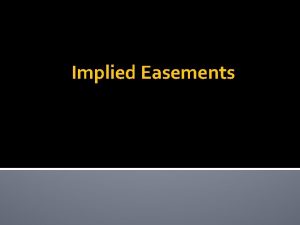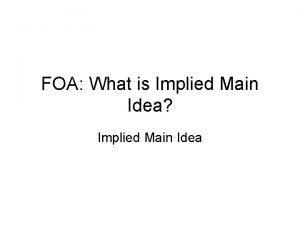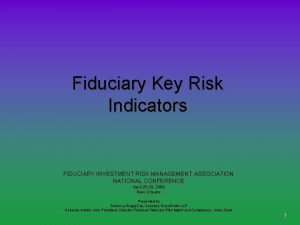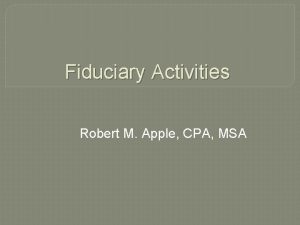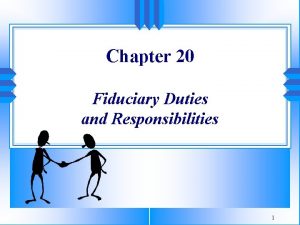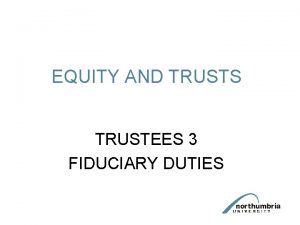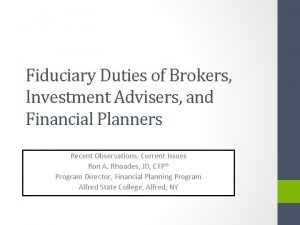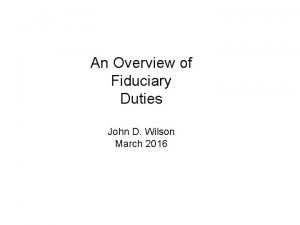Fiduciary Duties and the Implied Covenant of Good






























- Slides: 30

Fiduciary Duties and the Implied Covenant of Good Faith and Fair Dealing in Limited Liability Companies: Delaware vs. New York * * * Proctor Heyman LLP Wilmington, DE * * * Kurt M. Heyman Melissa N. Donimirski Matthew W. Murphy

Fiduciary Duties: The LLC Act Delaware A. The Delaware LLC Act does not plainly state that the traditional fiduciary duties of loyalty and care apply by default as to managers or members of a limited liability company. In that respect, of course, the LLC Act is not different than the DGCL, which does not do that either. In fact, the absence of explicitness in the DGCL inspired the case of Schnell v. Chris–Craft. Arguing that then newly-revised DGCL was a domain unto itself, and that compliance with its terms was sufficient to discharge any obligation owed by the directors to the stockholders, the defendant corporation in that case won on that theory at the Court of Chancery level. But our Supreme Court reversed and made emphatic that the new DGCL was to be read in concert with equitable fiduciary duties just as had always been the case, stating famously that ‘inequitable action does not become legally permissible simply because it is legally possible. ’ Auriga Capital Corp. v. Gatz Properties, LLC, 40 A. 3 d 839, 849 (Del. Ch. 2012). B. 6 Del. C. § 18 -1104: In any case not provided for in this chapter, the rules of law and equity. . . shall govern. 1

Fiduciary Duties: The LLC Act Delaware, cont’d C. 6 Del. C. § 18 -1101(c): To the extent that, at law or in equity, a member or manager or other person has duties (including fiduciary duties) to a limited liability company or to another member or manager or to another person that is a party to or is otherwise bound by a limited liability company agreement, the member's or manager's or other person's duties may be expanded or restricted or eliminated by provisions in the limited liability company agreement; provided, that the limited liability company agreement may not eliminate the implied contractual covenant of good faith and fair dealing. 2

Fiduciary Duties: The LLC Law New York A. Also does not expressly state that traditional fiduciary duties apply to managers of LLCs. B. N. Y. LLC Law § 409(a): A manager shall perform his or her duties as a manager. . . in good faith and with that degree of care that an ordinarily prudent person in a like position would use under similar circumstances. C. N. Y. LLC Law § 417(a)(1): Subject to the provisions of this chapter. . . [t]he operating agreement may set forth a provision eliminating or limiting the personal liability of managers to the limited liability company or its members for damages for any breach of duty in such capacity, provided that no such provision shall eliminate or limit [] the liability of any manager . . . [for] acts or omissions . . . in bad faith or involv[ing] intentional misconduct or a knowing violation or law. . 3

Fiduciary Duties: The Case Law Delaware A. Historically, Delaware cases assumed, based on Section 1101(c), but without analysis, that managers of LLCs have traditional fiduciary duties unless contradicted by the terms of the LLC agreement. • Phillips v. Hove, 2011 WL 4404034, at *24 (Del. Ch. Sept. 22, 2011) (“Unless limited or eliminated in the entity's operating agreement, the member-managers of a Delaware limited liability company [ ] owe traditional fiduciary duties to the LLC and its members. ”). • In re Atlas Energy Res. , LLC, 2010 WL 4273122, at *6 (Del. Ch. Oct. 28, 2010) (“[I]n the absence of explicit provisions in an [LLC] agreement to the contrary, the traditional fiduciary duties owed by corporate directors. . . apply in the [LLC] context. ”). • Kelly v. Blum, 2010 WL 629850, at *10 (Del. Ch. Feb. 24, 2010) (“Delaware cases interpreting Section 18– 1101(c) have concluded that, despite the wide latitude of freedom of contract afforded to contracting parties in the LLC context, ‘in the absence of a contrary provision in the LLC agreement, ’ LLC managers and members owe ‘traditional fiduciary duties of loyalty and care’ to each other and to the company. ” (internal quotes omitted)). 4

Fiduciary Duties: The Case Law Delaware, cont’d B. In 2012, the Court of Chancery Expressly Finds that Default Fiduciary Duties Apply to LLC Managers In Auriga Capital Corp. v. Gatz Properties, LLC, 40 A. 3 d 839 (Del. Ch. 2012), Chancellor Strine found that the terms of the LLC agreement at issue set forth essentially traditional fiduciary duties of loyalty and care for the manager, so it was arguably unnecessary for the Court of Chancery to reach the issue of whether traditional fiduciary duties applied by default. In dictum, however, the Chancellor proceeded to find that traditional fiduciary duties did apply to managers of LLCs, relying heavily on the statutes quoted above, and noting that it made no sense to permit the elimination of fiduciary duties if they did not already exist. Thus, because the LLC Act provides for principles of equity to apply, because LLC managers are clearly fiduciaries, and because fiduciaries owe the fiduciary duties of loyalty and care, the LLC Act starts with the default that managers of LLCs owe enforceable fiduciary duties. Gatz, 40 A. 3 d at 851. At the time of this decision, however, there was considerable scholarly debate about this issue, with then-Chief Justice Steele of the Delaware Supreme Court (Delaware’s sole appellate court) leading the charge for the position that traditional fiduciary duties do not apply by default in the alternative entity context. 5

Fiduciary Duties: The Case Law Delaware, cont’d C. The “Slapdown” On appeal, the Delaware Supreme Court affirmed the result of Auriga, but made clear that it was doing so solely on contractual grounds, holding that the Chancellor’s ruling on default fiduciary duties was “dictum without precedential value. ” The Court further stated: [T]he merits of the issue whether the LLC statute does—or does not—impose default fiduciary duties is one about which reasonable minds could differ. Indeed, reasonable minds arguably could conclude that the statute—which begins with the phrase, ‘[t]o the extent that, at law or in equity, a member or manager or other person has duties (including fiduciary duties)’ — is consciously ambiguous. Gatz Properties, LLC v. Auriga Capital Corp. , 59 A. 3 d 1206, 1218 -19 (Del. 2012). 6

Fiduciary Duties: The Case Law Delaware, cont’d C. The “Slapdown, ” cont’d The Court took the additional step of admonishing the Chancellor for providing his opinion on broader questions of law not directly implicated by the present dispute, saying: [T]the court's excursus on this issue strayed beyond the proper purview and function of a judicial opinion. “Delaware law requires that a justiciable controversy exist before a court can adjudicate properly a dispute brought before it. ” We remind Delaware judges that the obligation to write judicial opinions on the issues presented is not a license to use those opinions as a platform from which to propagate their individual world views on issues not presented. . To the extent Delaware judges wish to stray beyond those issues and, without making any definitive pronouncements, ruminate on what the proper direction of Delaware law should be, there appropriate platforms, such as law review articles, the classroom, continuing legal education presentations, and keynote speeches. Gatz, 59 A. 3 d at 1219 -20. 7

Fiduciary Duties: The Case Law Delaware, cont’d D. The Court of Chancery Responds… Exactly three weeks after the Supreme Court’s “slapdown” decision, Vice Chancellor Laster issued his opinion in Feeley v. NHAOGC, LLC, 62 A. 3 d 649 (Del. Ch. 2012), in which he adopted Chancellor Strine’s reasoning from Auriga in deciding whether default fiduciary duties applied to a dispute over control of an LLC -- an issue that was squarely before the Court this time. Vice Chancellor Laster observed that: Although the Delaware Supreme Court determined that the Chancellor should not have reached the question of default fiduciary duties, his explanation of the rationale for imposing default fiduciary duties remains persuasive, at least to me. In citing the Chancellor's discussion I do not treat it as precedential, but rather afford his views the same weight as a law review article, a form of authority the Delaware Supreme Court often cites. 62 A. 3 d at 661 -62. 8

Fiduciary Duties: The Case Law Delaware, cont’d D. The Court of Chancery Responds, cont’d The Vice Chancellor also squarely confronted the Supreme Court’s observations about the applicable legislative language: The introductory phrase “[t]o the extent that” in Section 18– 1101(c) does not imply that the General Assembly was agnostic about the ontological question of whether fiduciary duties exist in limited liability companies. The same phrase appears in the parallel provision in the Delaware Limited Partnership Act (the “LP Act”), 6 Del. C. § 17– 1101(d), and there has never been any serious doubt that the general partner of a Delaware limited partnership owes fiduciary duties. As the Chancellor explained in Auriga, the introductory phrase “makes clear that the statute does not itself impose some broader scope of fiduciary coverage than traditional principles of equity…. ” 9

Fiduciary Duties: The Case Law Delaware, cont’d D. The Court of Chancery Responds, cont’d A “partner” [] might, or might not, owe default fiduciary duties. For Section 17– 1101(d) to say that fiduciary duties can be restricted or eliminated “[t]o the extent that . . . a partner” owes fiduciary duties recognizes these possibilities. A “person” similarly might not owe fiduciary duties to the entity, or could owe duties as an officer or employee of the partnership, as an agent, or as a party who controls an entity that serves in a fiduciary capacity. For Section 17– 1101(d) to say that fiduciary duties can be restricted or eliminated “[t]o the extent that. . . a partner or other person” owes fiduciary duties acknowledges these situationally specific possibilities and recognizes that epistemological questions about the extent to which a partner or other person owes duties will be answered by the role being played, the relationship to the entity, and the facts of the case. 10

Fiduciary Duties: The Case Law Delaware, cont’d D. The Court of Chancery Responds, cont’d The same is true for the LLC Act. … Under the LLC Act, there are two basic types of members: members who are also managers and exercise managerial functions in a member-managed LLC, and members who are passive investors like limited partners. Managers and managing members owe default fiduciary duties; passive members do not. As with a limited partnership, a “person” may owe fiduciary duties depending on whether that person controls a manager of the LLC or otherwise has a fiduciary relationship to the LLC. The phrase “[t]o the extent that” recognizes these differing possibilities without implying that all members or all persons necessarily always or never owe default fiduciary duties. Feeley, 62 A. 3 d at 661 -63 (internal cites omitted). 11

Fiduciary Duties: The Case Law Delaware, cont’d E. The Delaware General Assembly Settles the Issue The General Assembly swiftly reacted to this controversy between the courts, and drafted an amendment to the LLC Act, 6 Del. C. § 18 -1104 (2013), which states: In any case not provided for in this chapter, the rules of law and equity, including the rules of law and equity relating to fiduciary duties. . . shall govern. 12

Fiduciary Duties: The Case Law New York A. For the most part, New York courts, like Delaware courts, simply assumed that managers of LLCs owe fiduciary duties, without significant analysis, and also without analysis of the statutory language of the LLC Law. n In re Die Fliedermaus LLC, 323 B. R. 101, 110 (Bankr. S. D. N. Y. 2005) (under NY law, the duty imposed on a manager of an LLC is the same fiduciary duty standard applied to corporate directors). n Willoughby Rehab. & Health Care Ctr. , LLC v. Webster, 831 N. Y. S. 2 d 357 (Sup. Ct. 2006), order aff’d, 46 A. D. 3 d 801, (N. Y. App. Div. 2 nd Dept. 2007) (an LLC, which has the attributes of both a corporation and a partnership, gives rise to a relationship among its members similar to that of partners). 13

Fiduciary Duties: The Case Law New York, cont’d B. While many New York court decisions have limited the fiduciary duty analysis to requirements expressly provided by the language of the operating agreement, at least one Supreme Court decision goes further in its conclusion that managers of LLCs owe fiduciary duties, including the duty to affirmatively disclose. n Mc. Guire Children, LLC v. Huntress, 2009 WL 1693725 (Sup. Ct. 2009) (“The fiduciary duties Huntress assumed by serving as managing member of the five (5) LLCs include most pertinently the obligation to make full disclosure of all material facts involving the LLCs. Huntress also owed Mc. Guire Children a ‘duty of undivided and undiluted loyalty’ requiring him to ‘single-mindedly pursue the interests’ of Mc. Guire Children, the fellow LLC member to whom this duty of loyalty was owed. Huntress' fiduciary duties to Mc. Guire Children do not arise out of the language of the operating agreements but of the relationship he voluntarily entered into by agreeing to become a member in an LLCs and their managing member. ”). 14

Fiduciary Duties: The Case Law New York, cont’d The Mc. Guire Children Court further noted that the fiduciary duty was not limited to the statutory duty under § 409(a) or the contractual provisions incorporating those duties: [T]he fiduciary duties owed by partners and LLC members are owed directly to one another and ordinarily cause harm first to the fellow partner or LLC member. Here, the alleged harm to Mc. Guire Children is based primarily on Huntress' breach of his duties to make full disclosure and devote undivided loyalty to the Mc. Guire Children's interest as opposed to a breach of the statutory duty (LLCL § 409[a]) and contractual duty (contained in section 4. 2 of each operating agreement) to exercise proper business judgment. It is this direct common law fiduciary duty which underlies all of Mc. Guire Children's causes of action in this litigation. 2009 WL 1693725 at *17. 15

Elimination of Fiduciary Duties Delaware 6 Del. C. § 18 -1101(c): To the extent that, at law or in equity, a member or manager or other person has duties (including fiduciary duties) to a limited liability company or to another member or manager or to another person that is a party to or is otherwise bound by a limited liability company agreement, the member's or manager's or other person's duties may be expanded or restricted or eliminated by provisions in the limited liability company agreement; provided, that the limited liability company agreement may not eliminate the implied contractual covenant of good faith and fair dealing. 16

Elimination of Fiduciary Duties Delaware, cont’d A. Nearly every possible challenge has been made to the ability to eliminate or restrict fiduciary duties, including challenges based on public policy, but Delaware courts have consistently held that, where the elimination of duties is clear, it will be upheld, and that the public policy of freedom of contract, enshrined in the LLC Act Section 18 -1101 is paramount. n 6 Del. C. § 18 -1101(b) (“It is the policy of this chapter to give the maximum effect to the principle of freedom of contract and to the enforceability of limited liability company agreements. ”). n Fisk Ventures, LLC v. Segal, 2008 WL 1961156, *11 (Del. Ch. May 7, 2008) (fiduciary duty liability successfully eliminated for members of an LLC when the LLC agreement eliminated such duties “to the maximum extent permitted by law”; the members of an LLC have no duties beyond those explicitly articulated in the LLC agreement). n ABRY Partners V, L. P. v. F & W Acquisition LLC, 891 A. 2 d 1032, 1063 (Del. Ch. 2006) (“In the alternative entity context, where it is more likely that sophisticated parties have carefully negotiated the governing agreement, the General Assembly has authorized even broader exculpation, to the extent of eliminating fiduciary duties altogether. ”). 17

Elimination of Fiduciary Duties New York N. Y. LLC Law § 417(a): Subject to the provisions of this chapter, the members of a limited liability company shall adopt a written operating agreement that contains any provisions not inconsistent with law or its articles of organization relating to (i) the business of the limited liability company, (ii) the conduct of its affairs and (iii) the rights, powers, preferences, limitations or responsibilities of its members, managers, employees or agents, as the case may be. 18

Elimination of Fiduciary Duties New York, cont’d N. Y. LLC Law § 417(a) cont’d: The operating agreement may set forth a provision eliminating or limiting the personal liability of managers to the limited liability company or its members for damages for any breach of duty in such capacity, provided that no such provision shall eliminate or limit: (1) the liability of any manager if a judgment or other final adjudication adverse to him or her establishes that his or her acts or omissions were in bad faith or involved intentional misconduct or a knowing violation of law or that he or she personally gained in fact a financial profit or other advantage to which he or she was not legally entitled or that with respect to a distribution the subject of subdivision (a) of section five hundred eight of this chapter his or her acts were not performed in accordance with section four hundred nine of this article; or (2) the liability of any manager for any act or omission prior to the adoption of a provision authorized by this subdivision. It does not appear that the limits of this section have been fully litigated. 19

Elimination of Fiduciary Duties New York, cont’d A. Recent New York Opinion New York case law had not been finally resolved on the issue of elimination of fiduciary duties. However, the Court of Appeals ruled in Pappas v. Tzolis, 982 N. E. 2 d 576 (N. Y. 2012), that fiduciary duties could be eliminated in an LLC agreement. Interestingly, although the LLC was incorporated in Delaware, its LLC agreement was governed by New York law. The Court of Appeals did not expressly cite Delaware law in its holding. It did, however, reverse the Appellate Division’s decision refusing to follow Delaware law. 20

Segue to the Implied Covenant of Good Faith and Fair Dealing Delaware A. 6 Del. C. § 18 -1101(c): To the extent that, at law or in equity, a member or manager or other person has duties (including fiduciary duties) to a limited liability company or to another member or manager or to another person that is a party to or is otherwise bound by a limited liability company agreement, the member's or manager's or other person's duties may be expanded or restricted or eliminated by provisions in the limited liability company agreement; provided, that the limited liability company agreement may not eliminate the implied contractual covenant of good faith and fair dealing. 21

Segue to the Implied Covenant of Good Faith and Fair Dealing Delaware, cont’d B. While the Delaware courts have been consistent in holding that managers can contractually disclaim fiduciary duty liability, they have struggled to determine how this ability to disclaim liability affects the implied covenant of good faith and fair dealing. In Nemec v. Shrader, 991 A. 2 d 1120 (Del. 2010), in an unusual split decision by the Delaware Supreme Court, a 3 -justice majority narrowly interpreted when the implied covenant would be implicated: The implied covenant of good faith and fair dealing involves a “cautious enterprise, ” inferring contractual terms to handle developments or contractual gaps that the asserting party pleads neither party anticipated. “[O]ne generally cannot base a claim for breach of the implied covenant on conduct authorized by the agreement. ” We will only imply contract terms when the party asserting the implied covenant proves that the other party has acted arbitrarily or unreasonably, thereby frustrating the fruits of the bargain that the asserting party reasonably expected. When conducting this analysis, we must assess the parties’ reasonable expectations at the time of contracting and not rewrite the contract to appease a party who later wishes to rewrite a contract he now believes to have been a bad deal. Parties have a right to enter into good and bad contracts, the law enforces both. …The implied covenant only applies to developments that could not have been anticipated, not developments that the parties simply failed to consider – particularly where the contract authorizes the Company to act exactly as it did here. 22

Segue to the Implied Covenant of Good Faith and Fair Dealing Delaware, cont’d A spirited 2 -justice dissent, authored by Justice Jack B. Jacobs and joined by Justice Carolyn Berger, followed, in which the minority argued that the implied covenant was properly implicated—as here—when the company exercised “discretion” in taking action that it was not contractually required to take. …We respectfully disagree, because Delaware law does not support, let alone mandate, such a narrow construction of the implied covenant. A party does not act in bad faith (the majority argues) by relying on contract provisions for which the party bargained, even if the result is to eliminate advantages the counterparty would otherwise receive. That is a correct, but incomplete statement of the law. To avoid running afoul of the implied covenant, the challenged conduct must also further a legitimate interest of the party acting in reliance on the contract. Stated differently, under Delaware case law, a contracting party, even where expressly empowered to act, can breach the implied covenant if it exercises that contractual power arbitrarily or unreasonably. 23

2013: The “Year of Good Faith” in Delaware A. SIGA Tech. , Inc. v. Pharm. Athene, Inc. , 67 A. 3 d 330 (Del. May 24, 2013): Holding that an agreement to negotiate in good faith is enforceable. B. Norton v. K-Sea Transp. Partners. L. P. , 67 A. 3 d 354 (Del. May 28, 2013) and Brinckerhoff v. Enbridge Energy Co. , 67 A. 3 d 369 (Del. May 28, 2013): Affirming reliance on “special approval” provisions governing self-interested transactions, which provided that compliance therewith (including reliance on financial experts) created presumption of good faith (in the fiduciary sense) and that resolution of a conflict in accordance with its provisions would negate a claim for breach of contract. Reasoning does not conflict with implied covenant of good faith and fair dealing because breach of the implied covenant is a breach of contract and applies to things not expressly covered by the contract; “special approval” provisions make express the required treatment of conflict of interest transactions to avoid liability. 24

2013: The “Year of Good Faith” in Delaware cont’d C. Gerber v. Enter. Prods. Holdings, LLC, 67 A. 3 d 400 (Del. June 10, 2013), rev’d in part on other grounds, Winshall v. Viacom Int’l, Inc. , 76 A. 3 d 808 (Del. 2013): Also involved “special approval” provision, but reached a different result. The dispute in Gerber arose out of a challenged transaction and the subsequent sale of the company in an attempt to eliminate liability. In reversing the Court of Chancery, the Supreme Court, per Justice Jacobs (author of the Nemec dissent), noted that the Vice Chancellor had improperly conflated the “good faith” requirement found in the fiduciary duty context with the “good faith” mandated by the implied covenant. While they are similar concepts, there are some significant differences, most notably the temporal distinctions between the dueling “good faith” requirements. The Supreme Court expressly adopted Vice Chancellor Laster’s analysis from ASC Allegiance Real Estate Fund v. Scion Breckenridge Managing Member, LLC, 50 A. 3 d 434, 440– 42 (Del. Ch. 2012), aff'd in part, rev'd in part on other grounds, 68 A. 3 d 665, 2013 WL 1914714 (Del. 2013), as a correct statement of Delaware law distinguishing the implied covenant and the fiduciary duty of good faith: 25

2013: The “Year of Good Faith” in Delaware cont’d An implied covenant claim. . . looks to the past. It is not a free-floating duty unattached to the underlying legal documents. It does not ask what duty the law should impose on the parties given their relationship at the time of the wrong, but rather what the parties would have agreed to themselves had they considered the issue in their original bargaining positions at the time of contracting. “Fair dealing” is not akin to the fair process component of entire fairness, i. e. , whether the fiduciary acted fairly when engaging in the challenged transaction as measured by duties of loyalty and care whose contours are mapped out by Delaware precedents. It is rather a commitment to deal “fairly” in the sense of consistently with the terms of the parties' agreement and its purpose. Likewise “good faith” does not envision loyalty to the contractual counterparty, but rather faithfulness to the scope, purpose, and terms of the parties' contract. Both necessarily turn on the contract itself and what the parties would have agreed upon had the issue arisen when they were bargaining originally. . . 26

2013: The “Year of Good Faith” in Delaware cont’d The retrospective focus applies equally to a party's discretionary rights. The implied covenant requires that a party refrain from arbitrary or unreasonable conduct which has the effect of preventing the other party to the contract from receiving the fruits of its bargain. When exercising a discretionary right, a party to the contract must exercise its discretion reasonably. The contract may identify factors that the decision-maker can consider, and it may provide a contractual standard for evaluating the decision. Express contractual provisions always supersede the implied covenant, but even the most carefully drafted agreement will harbor residual nooks and crannies for the implied covenant to fill. In those situations, what is “arbitrary” or “unreasonable”—or conversely “reasonable”—depends on the parties' original contractual expectations, not a “free-floating” duty applied at the time of the wrong. Gerber, 67 A. 3 d at 418 -19 (quoting ASC Allegiance, 50 A. 3 d at 440 -42 (internal citations, footnotes, and quotations omitted)) (emphasis in original). 27

2013: The “Year of Good Faith” in Delaware cont’d The Vice Chancellor erred, the Supreme Court determined, in incorrectly determining that a valid contractual exculpation of the fiduciary “good faith” would necessarily also eliminate liability under the implied covenant. The Court noted that, while the fiduciary “good faith” standard could be satisfied by strict compliance with the contractual terms, the implied covenant analysis required more; specifically, that while an ineffective expert’s opinion satisfied the contractual requirements, if the parties had thought to discuss the expert’s opinion in more detail, they undoubtedly would have insisted that it at least be an effective opinion. Therefore, the implied covenant “good faith” standard was not satisfied. Thus, what distinguished this case from Norton and Brinckerhoff was the reliance on a flawed expert opinion that did not directly address the issue requiring “special approval. ” 28

Good Faith in New York A. In New York, all contracts imply the covenant of good faith and fair dealing in the course of performance. Neither party to a contract shall do anything that will destroy or injure the rights of the other party to receive the fruits of the contract. While the implied covenant does not imply obligations inconsistent with the terms of the contractual relationship, it does encompass promises that a reasonable person would understand as included. 511 W. 232 nd Owners Corp. v. Jennifer Realty Co. , 773 N. E. 2 d 496 (N. Y. 2002). The implied covenant prevents “bad faith targeted malevolence in the guise of business dealings. ” Richbell Info. Servs. , Inc. v. Jupiter Partners, L. P. , 765 N. Y. S. 2 d 575, 587 (App. Div. 1 st Dept. 2003) (citing Ivanhoe Partners v. Newmont Mining Corp. , 535 A 2 d 1334, 1344 (Del. 1987)). Note citation to Delaware law. B. The decision to exercise contractual rights, absent bad faith conduct, does not violate the implied covenant. LJL 33 rd St. Assoc. , LLC v. Pitcairn Prop. Inc. , 725 F. 3 d 184 (2 d Cir. 2013); Richbell, 765 N. Y. S. 2 d at 587 (“[The] limitation on an apparently unfettered contract right may be grounded either on the construction of the parties’ fiduciary obligations or on the purely contractual rule that even an explicitly discretionary contract right may not be exercised in bad faith so as to frustrate the other party’s right to benefit under the agreement. ”). 29
 What is the difference between the old and new covenant
What is the difference between the old and new covenant Breach of fiduciary duty remedies
Breach of fiduciary duty remedies Good thoughts good words good actions
Good thoughts good words good actions Tom hello good morning
Tom hello good morning Good afternoon buenas tardes
Good afternoon buenas tardes You are good you are good when theres nothing good in me
You are good you are good when theres nothing good in me Good afternoon morning
Good afternoon morning Lds oath and covenant of the priesthood
Lds oath and covenant of the priesthood Signs and seals of the covenant
Signs and seals of the covenant 321 vs 338 fiduciary
321 vs 338 fiduciary Lincoln fiduciary hub
Lincoln fiduciary hub Trust reporting services
Trust reporting services Fiduciary risk management
Fiduciary risk management Fiduciary indianapolis
Fiduciary indianapolis Fox rothschild fiduciary attorney summit
Fox rothschild fiduciary attorney summit Fiduciary risk assessment
Fiduciary risk assessment Accounting for fiduciary funds
Accounting for fiduciary funds Key risk indicators for vendor management
Key risk indicators for vendor management Fiduciary investment risk management association
Fiduciary investment risk management association Eternal covenant 20
Eternal covenant 20 Ark
Ark The covenant 2
The covenant 2 Neponsit v emigrant
Neponsit v emigrant Covenant health compassionnet
Covenant health compassionnet I will establish my covenant with you
I will establish my covenant with you Standout dare ii
Standout dare ii Beriyth
Beriyth Covenant of grace presbyterian church
Covenant of grace presbyterian church Covenant technology partners
Covenant technology partners 7 primary features of the davidic covenant
7 primary features of the davidic covenant Wesley's covenant prayer
Wesley's covenant prayer
